.
.
photo by Francis Wolff/© Mosaic Images
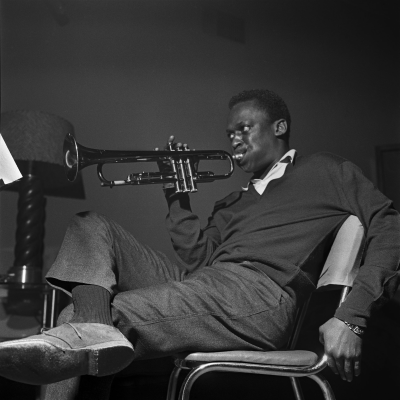
Miles Davis during Cannonball Adderley’s “Somethin’ Else” session, Van Gelder Studio, Hackensack, NJ, March 9, 1958.
.
_____
.
Few artists inspire creativity like Miles Davis. This collection of poetry by 50 poets from all over the world is evidence of that.
As always, thanks to the poets, and I hope you enjoy…
Joe
.
.
.
At the conclusion of the poems, biographies of the poets and artists contributing to this collection are listed in the order in which their work appeared
.
.
___
.
.
A selection of recordings by Miles Davis appear throughout the collection. “Blue in Green” is from Kind of Blue
.
.
___
.
.
All The Way Home With Miles
When we were yet groping
You found the notes
Did you
how could
……..you know
that we were right there with you,
……………………………………………listening
to hear the steamy passions
………………………………………..you were signaling
Did you think we hadn’t been there yet
……….Or that we’d lost our way
……….And forever be searching
Were you fearing that again,
……….you’d be alone
……………….with your pain
But even your silences were long and telling
A’burst with the emotions you were giving us
Ah, Miles, it was ordained
…………And thus, inscribed in prophesy that
….when we couldn’t find the words or
the illusive avenues,
Of our lost yesteryears
You’d transport us there,
……………………………anyway,
……………………………….to anywhere
You’d take us
from then to now,
……..and from here to there
…………..to all the way home.
.
…………………..(published in Jerry Jazz Musician, Aug. 24, 2020)
.
by Susandale
.
___
.
.
Early Miles
Early Miles was all vowel,
a blue, black, ebony sweep,
the sound of life lived deeply
as a diver can dive into
bottomless water.
Bottomless the water
a diver can dive into,
the sound of life lived deeply,
a blue, black, ebony sweep,
early Miles was all vowel.
The sound of life lived deeply,
a blue, black, ebony sweep
a diver can dive into,
early Miles was all vowel,
bottomless the water.
A blue, black, ebony sweep,
early Miles was all vowel,
bottomless the water —
the sound of life lived deeply
a diver can dive into.
A diver can dive into
a blue, black, ebony sweep:
bottomless water, early Miles
was all vowel, the sound
of life lived deeply.
.
…………………..(First published in A Stranger to the Land; Garden Street Press, 1997)
by Michael L. Newell
.
___
.
Acrostic For Miles
Master of Jazz,
Illuminate our spirits.
Let us remember
Every quickening pulse of
Swing.
Defender of artistic merit,
Enoble us in our universality.
White, Black, and more –
Each is part of one humanity.
Yes!
Deepening fears
Abound in our time.
Virtue, Honor, Faith
Issue forth with clarion calls,
Sanctifying us – if we hear them.
.
by Joel Jacob Todd, Jr.
.
___
.
Love Me Some Miles
His trumpet, that of a pied piper
only he is the one with the bite
of a viper, his venom coursing through
my veins, addicted, I’m forever sprung
never to succumb to the horn of another
Miles, my melodic lover, a tattooed
Valentine, each note a salutation:
proclaiming, you’ll always be mine
Special deliveries of gifts abound
No one can replicate his sound
My teenage crush, now a life
long, loving devotion to Miles
.
…………………..(published in Jerry Jazz Musician on December 3, 2020)
.
by Aurora M. Lewis
.
___
.
Shelly’s Manne-Hole, 1967 Or Thereabouts
Miles Davis, blue-black as night, mysterious as a cat
walking along a fence, lit by a silver moon.
His back turns away from an adoring audience.
Two or three notes from his trumpet
fall freeform into the silence of our regard.
Amazing bombs that tear no flesh, leave no blood.
Musical notes take us soaring without wings.
We fly over the silver moon with that cat
Miles, a god in human form.
Since 1991 he wanders the outer world,
not a lost soul, but a magus elevated.
We mortals carry on in the light of his memory,
dreaming sounds we heard, like watermarks on our skin.
.
by Judith Vaughn
.
___
.
Kind Of Blue
We were watching
shrimp boats working offshore
near Garden City
and listening to Miles on the radio
with Bill
the music was good
too good
the weather was good
too good
so good the gulls and pelicans came down like shit on rice
like shit literally
the sailors had to use umbrellas all afternoon
they couldn’t look up
later they asked
what color was the sky that day?
blue you said
but we couldn’t be sure—
it was dark
the wind picked up
then the waves came in
and gave the correct answer
what color was the sun?
and that was enough
.
by John Stupp
.
.
“Miles Davis,” by Sam Guillemot
.
.
Ode To Kind Of Blue:
All That We Need. Nothing More.
A seamless recording,
dreamy and drifting,
Miles’ trumpet hovers like a dragonfly,
suspended in a summer afternoon.
Standing in the shade,
the cool grass between our toes,
the music flows through the park like a soft breeze.
Cannonball’s alto darts through the trees,
Coltrane’s tenor blows out strong,
Bill’s piano gently ripples the water in the wading pool.
In the distance, kids are running through the sprinklers.
Everything is as it should be.
.
by Freddington
.
___
.
Blue In Green
Combing through the shelves in the Globe Bookstore
in Prague, I go past Havel, Hrabal and Kafka, then
stop at Kundera, pulling out his novel
The Unbearable Lightness of Being because
the stereo is playing Miles Davis’ “Blue in Green”.
Tentative notes on trumpet echo footsteps on the
cobblestone streets all turning into Wenceslas Square,
its people blithely unaware of what’s to come:
hiding in cellar jazz clubs, playwrights
in prison, intellectuals forbidden.
Saxophone hums the happy chatter of the hustle
of bell bottomed mini skirted youth
in theaters and bars, their lyrical low lighted dinners
and their soft advances fading away
like posters parched in the sun.
Piano’s delicate delay like wind chimes & sprinkled rain
glistening in soft neon light signals the end
of an unfolding renaissance of art/expression/life style
that was the Prague Spring in 1968.
When Soviet tanks thundered in to Wenceslas Square
everything turned inwards for the Czechs.
Yet, some resolved not to cave in,
never letting their blue in green lightness of being
be put down or rolled over.
.
by DH Jenkins
.
___
.
River
I was listening Miles Davis when my father died
and I felt emptiness. I felt emptiness for the second time.
The first time I felt it in my childhood, when I saw the drying
river and was afraid. “Don’t be afraid,” said my father.
“The river begins at source, everything begins
at source and returns to source.”
He was a rower. I saw him in a boat many times,
he was a champion. “Someday you will see as the river
surrenders itself to the sea,” he said. “Try to guess what
is inside me that moves inside you as well?”
“Love,” I said.
“Exactly,” he said.
I thought he took all the rivers away out of earth with
his boat and left only silent emptiness all around me.
“Love is the source,” I said to my dead daddy and have heard
the voice of him deep inside my heart: “That’s why we vanish,
this happens every single time without any exception,
we are the rivers.”
“And the rowers,” I thought and let him go.
.
…………………..(published in Jerry Jazz Musician, May 12, 2020)
.
by David Dephy
.
___
.
Ascenseur Pour L’Echafaud
This night, dark and melancholy,
allows no sleep and I find myself
in a dreary world of lost souls.
I pour a whiskey, drop the arm
of the turntable into the first groove
of Ascenseur pour l’échafaud.
Stepping out into the blackness,
the first low moan from Miles’ horn,
brooding and moody,
follows me into the quiet air.
This summer night, the darkness,
its shadows and outlines,
are broken by a single shaft
from beyond the dim caverns
of hedges and shrubbery.
A neighbor’s light creates
a sudden hole, then dies.
The muted trumpet, somber and lonely,
speaks mournfully of solitude, desolation
and I remember wandering an empty
rain-slicked Paris street,
a black and white world
of old buildings and mist,
thinking about what falling asleep
would be like — when the last haunting
and achingly beautiful notes
of Chez Le Photographe Du Motel,
drift off, magical and fading,
like a kind of blue night.
.
by Russell Dupont
.
___
.
It Kind Of Blew Past Me
I never could reconcile
the wistful, esoteric solos
on “Kind of Blue”
with the Prince of Darkness,
the arrogant heroin addict.
But what do we know
of any other’s experience?
Every time I listen to “Blue and Green”
I hear more warmth and humanity
than I could ever express.
The wife beating, the drugs,
the beatings by racist cops,
none of those demons are there.
Or maybe, what he means
is that they all are.
.
by Charles Joseph Albert
.
___
.
Cobalt Blue Mood
It’s one of those moments.
She only has ears for Miles Davis.
Reflecting on things that never came to be—
missed trains and broken clocks.
Although the Fates dangled the lure of fresh starts,
she remained captive too long to the ambitions of others.
Brainwashed as a child
by someone plagued by confusion,
she trusted everyone anyway while hanging
on her mother’s every word and sigh.
She’s left with a fusion of bittersweet feelings,
engulfed in a swell of saudade,
that Portuguese condition of longing
from a culture of Fado music and vibrant blue-and-white tiles.
Bewildered by “if onlys,”
she discovered truths at such a late stage.
You were really OK all along.
It was them.
So she voyages to exotic realms,
reality obscured by her desires
and nocturnal illusions. Why don’t exhilarating
moments overpower the Now?
A trumpet pierces the silence.
The unfulfilled longing subsides.
Resignation meets contentment.
Saved again by the blues.
.
by Amy Barone
.
.
“Miles Davis: In Person,” by Russell Dupont
.
.
Initiation
……………(State College, 1993)
After backpacking
a skunky brick of Mexican
on a long bus ride, the best
Happy Valley has to offer
is a love-seat,
some piss-warm Pabst,
and a gray moray gliding
through a filthy tank
while dusty speakers spill
Bitches Brew,
its low-end grooves
haunting every inch
of this dank room, shuttered
from the coming
fall morning.
Across another lost weekend
those scuffed discs
purists love to hate
keep spinning–
their binge-worthy vamp
keyed to drone and slither,
a table set
for Miles to tap
spines with blasting
echoed notes, electric
pick-ups clipped
to his muted bell
where a full breath can stir
sounds, dark and ominous
to my untrained ears.
.
…………………..(originally published in Brilliant Corners)
.
by Fred Shaw
.
___
.
Miles
…The only aristocracy lies in not touching—Fernando Peossa
We once walked three miles with gas
leaking from a red plastic can I held
between us and both of us laughing
with no sound at our inability to figure
the speed of our feet vs. velocity of the drip
in order to determine if there would be any gas
when we arrived back at the old Fairlane,
that bastard Fairlane, the same car
that had left us stranded once before, atop
Dick’s Gap, dark mountains looming over the valley
as we trudged down the curvy two-lane road
in the green mountain heat, silent, he
with Miles and me with Monk,
though I held his hand once, standing
beside his brother’s grave, the newspapers
full of explanations of the necessity of the death,
he squeezed my pink hand until it was
white as the underbelly of a flatfish,
a sea fish, one that lived deep beneath the sound,
drifting in that vacuum, always on the lookout,
drifting among the black stones, the weeds,
the millennia of coral.
.
…………………..(published in Jerry Jazz Musician, May 12, 2020)
.
by John Riley
.
___
.
Blue In Green
1. .life moves from code orange to red
……………….malevolence …a side effect
…………………………….of governmental discord
….the 21st century burns after fires cease
.
2. .I walk past boarded up stores & vacant streets
……………….see rainbows slip into the void
….but blue & green step back ..become allies
……………….blue in green …green in blue
.
3.. Miles Davis plays his trumpet
……………….my speculations are put to rest
….colors of the sky mellow after dusk
……………..I align with blue & green
.
…………………..(published in Oddball Magazine October 13, 2020)
.
by Patricia Carragon
.
.
A musical interlude…Listen to Miles Davis play “Something I Dreamed Last Night,” from Steamin’ with the Miles Davis Quintet
.
.
Miles Davis Comes To Lawrenceville
………………..for John Grochalski
You remember the blade of his horn
running that voodoo down, driving
the lank end of Butler St.
somewhere in the ugly weeds
of your twenties, the haloed refinery
tankers rampant on the river’s edge,
and Grochalski at the wheel while
somewhere out in the cracked night
a girl waited, swarmed in want.
The silence of those tankers, big and white
as Polish butchers, blood in the drab
folds of their skin, haunts this music now.
Mournful as the plain gray sentences
of ghosts, the steps shattered
snaking up our shared hills, we felt
the accumulated loneliness of parishioners
and widows exiting St. Augustine’s.
The sky was a grid straining to find
some looser language, some mute cry
absent of recrimination.
The cool shade of night drawing down
on our desire, one last exhalation
weary of the wish for redemption
and then, of course, the fade-out.
.
…………………..(published in Jerry Jazz Musician, Feb. 17, 2020)
.
by Kristofer Collins
.
___
.
The Spaces Between: Miles Davis
…………Music is a painting you can hear and a painting is music that you can see.
— Miles Davis
Listen with me to Miles’ plaintive trumpet
……dusky purples …witching-hour burgundies
broken by silence empty of echoes
the spaces between
……where the song lies
………………………………………..where art sings.
Float through surreality
………………………………………..raveled through a horn
or painted with a twist à la Picasso
Kandinsky …..Jean-Michel Basquiat.
……………………………………………..Enter slowly with me
………………………………………………….bottom right
………………………………………..where colour pulls
eyes up through purple dusk
…..orange spiral
………………………..a whisper in an ear
…………………………………………………an eye looking back.
Travel through evening
into the colours of midnight and jazz
………………………………………………………..where faces
turn …..away….. —.. in dance?
a turning of another kind? ….. —.. held infinitely
as midnight shades descend into quietude
pearlescent as “Concierto de Aranjuez”
its haunting garden of emotion
………………………………………………enigmatic
as birdsong …..as longing.
Caught in the net of his painting
the dusk-to-dawn world
holds me like his adagio-
rendered jazz …..a portal
across the chasm ……of night.
Listen with me to Miles’ plaintive trumpet
…..dusky purples …..witching-hour burgundies
broken by silence empty of echoes
the spaces between
……..where the song lies
……………………………………….where art sings.
.
by Kathryn MacDonald
..
.
photo by Francis Wolff/© Mosaic Images
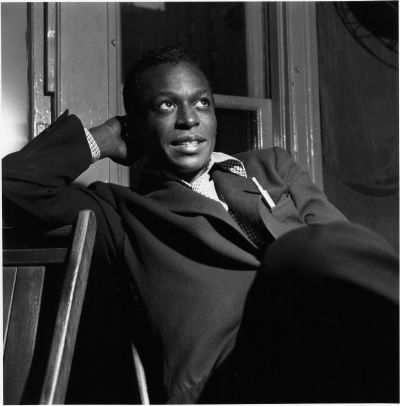
Rehearsal for the “Miles Davis All Stars” second session, NYC, April 1953
.
.
Call It An Obsession
I first heard him play before I was a teen
See, my mother was into the Jazz scene
When I was 18 some brothers said I looked
like Frances Davis on the cover of his
Live at the Blackhawk, I failed to see my
resemblance to his first wife, I was flattered
it was all they talked about while getting high
listening to Miles that night
I bought my first Miles, Get Up With It
dedicated to Duke, later Kinda Blue
Bitches Brew, A Tribute to Jack Johnson, Tutu
I inherited my mother’s Sketches of Spain, now
I have my CD and her LP, Doo Bop, On the Corner
Birth of Cool, Miles’ collections and collaborations
with Trane, Miles and Monk at Newport
I’m far from through
Then there is Miles, The Autobiography
I had 2, gave one to my brother, 2 posters
on my wall, I’ve seen every movie or documentary
Including Frances, Betty, and a book by Cicely
Miles wasn’t very cool to these 3, he was complicated
one of a kind, a replication of his magical trumpet
you’ll never find, I just got a Jazz magazine dedicated
to Miles, I must admit he is an obsession of mine
.
by Aurora M. Lewis
.
___
.
So What (Live) In Stockholm, March 1960
I.
Both Davis’s trumpet & Coltrane tenor sax
solos blistered the cool tones of the quintet
one hot night at Konserthuset,
up North in Stockholm, 3/22/60
As Wynton Kelly tickled ivories & ebonies,
Paul Chambers grooved up his upright bass
while Jimmy Cobb kept a lively, tight beat throughout.
So what?
It’s music to be enjoyed and awed—
some pure magic before Midsommar.
The Swedes sat up & and took notice,
taking up the jazz flag & running with it,
making their own sounds,
blistering the Arctic Circle.
II.
Why be angry?
Coltrane wants in his free time
to chill back with
Sonny Rollins records
Coltrane’s not angry.
He tries to take his lines out of the ordinary,
playing everything at once—
So what?
.
by Carrie Magness Radna
.
___
.
Bitches Brew
Only a teenager
A hopeful drummer
I saw the album
In the racks
Picked it up to
See the electrifying
Almost frightening cover
So—Miles Davis
Who is this to me,
A rock’n’roll white boy?
Trumpet player, maybe?
No Nope
Put it back
Grabbed Crosby Stills and Nash
A really good album
Fast forward
The college dorm
Music mingles up and down and across
New sounds shared room to room
An education!
But none like the school across the hall
From whence comes
Dangerous and swirling notes
Discordant tones
Time signatures from hell
Irresistible pulses from
The Wild
I am drawn in
Standing in his doorway
Whoa, I ask, what’s this?
He points to the jacket
Miles, he says,
And his new band
Oh yeah, I nod
Seen it before
Miles Davis
He’s so badass,
I lie, badly
On the turntable
“Spanish Key”
Rumbles on
Freight train steady
A rhythm section
For the ages
Impelling movement
A paradox of rhythm:
Simple and compound
Smooth and thunderous
Solid and Mosaic
Organic and crafted
Then the Trumpet
Sailing high above
Declaring a new way
But who knows this way?
Who can hang?
Who can feel this vibe,
The unspoken expression
Percolating up from the
Deep well of the soul?
The hypnotic
cadence fades
There’s others, he says
indicating:
Coltrane and Mingus
Dizzy and Bird
Not now, I say, thirsty,
Just play that one again
.
…………………..(published in Jerry Jazz Musician, Dec. 3, 2020)
.
by Bob Walters
.
___
.
A Jazz Bar Wails, Sunday Night
Excuse me, the young woman said
can you go to the bathroom with me?
I’ve got to go real bad –
she had pink hair and deep dark skin
and I didn’t know what she was
talking about.
While the jazz band jumped and bopped
in a cool groove – guitar pellets,
chicka chicka drums –
please please, she said.
Another tune began, a Coltrane-sounding
run from the alto’s lower register,
and in the moment a memory
of Santa Fe – there was a crying young woman
there, a coke-stained waitress.
Take me with you, she said, causing
more temptation than repulse,
but still, no angel in the offing. I cannot
help you. I cannot help you. Cannot. Help.
Then pained squeals sounded again
from the bar as if the rhythm section
courted demons now. The saxophone wailed
in time. More more more, the squealer wanted more.
Unlike the saxophone, whose wail was strong,
this was the wail of the weak and helpless.
Where is that angel now?
This tune. I knew it. It was Gershwin,
from “Porgy and Bess,” the one
Miles Davis, not saxophone, but trumpet,
turned inside out from some aching place.
.
by Steve Paul
.
___
.
Miles’ Mouthpiece Pouch
miles attached the pouch
after the bend
where the trumpet bell started
widening out.
the pouch was close
to his lips and face.
maybe he also liked the smell
of new leather. I would have.
it’s good to have
a couple of
different mouthpieces
close at hand.
like if you
needed them
to play some notes
styling them, all so different.
having those extra mouthpieces
was to comfort you
just in case
to keep your sound
… just with so many
special notes
exactly in
your only miles style!
.
Postscript: There is a great picture of Miles, holding his
trumpet, with the mouthpiece pouch. It is on the cover of
the book, Miles, The Autobiography.
.
by Alan Yount
.
___
.
And Then There Were None
Old man on a balcony
rocked his grief through
long afternoon, listened
to Sketches of Spain
hour upon hour, smoked
a pipe redolent of cloves,
an empty rocker next
to his draped with flowery
cushions, rocking from time
to time when wind chimed in.
He hummed trumpet solos
in broken raspy voice, recited lines
from King Lear with quiet passion
of Miles Davis or Bill Evans
at their melancholy best,
“O, thou’lt come no more.
Never never never never never.”
He fell asleep while the music
played on, caught in a loop.
Miles welcomed onset of dusk.
Night spread its inevitable blanket.
.
by Michael L. Newell
.
.
“Funk Miles,” by Martel Chapman
.
.
Miles Runs The Voodoo Down
Miles boils his bitches brew
in a night of worlds much blacker than black
His demons and angels let out slack
for pharaohs dancing into the true
Miles runs the voodoo down
and serves it up with the taste of free
for those whose spirits would otherwise drown
without such wild, mad sanctuary.
.
…………………..(published in Jerry Jazz Musician, Jan. 14, 2018)
.
by R. Bremner
.
___
.
Listening To “Flamenco Sketches”
beginning
with a graphite bass line
of Spanish simulation
add a Mexican mural twist
a muted courtyard entered
through a tiled arch gateway
to an instrumental gathering
a smoke & twilight dancer
………………………sin rebozo
fluid in movement among
tenor blue & alto green Agave
fragrant from the piano scent of
………………………metate corn tortillas
warming on fired clay ovens
while modal intuitions
from Miles Julian Paul
James John & Bill connect
to embrace the heavens
& leave & overwhelm what remains
disproportionate to other scales played
………………………since 1959
the dancer halts to settle in also
.
by Terrance Underwood
.
.
A musical interlude…Listen to “Saeta” from Sketches of Spain
.
.
The Miles Country
I’ve never been to Spain
but I’ve listened to Sketches
on headphones
for at least half my life
and it feels like a marvelous place
where everything sounds
exactly what our souls
want music to sound like
when we’re alone
and daydreaming
about love
and what it means
to be alive
.
by Frank Wilkes
.
___
.
Miles Davis In Paris
I remembered someone saying
– with first name familiarity
but too young to have known him –
Miles would never
have stooped to a moonwalk.
Looking back through a nicotine haze
to the husky chic of the fifties
and then beyond, I might have added
or a Bojangles shuffle.
The first time he played in Paris
the habitués of St Germain
queued up to see him backstage.
When he improvised his score
to Ascenseur pour l’échafaud,
his horn was the loneliest
sound that year.
.
by David Cooke
.
___
.
moon dreams
two words
perfectly picture
Miles’ encounter
with how it is
all about
especially
presently
in reveries
he termed
ballads
he had no word to
call his feeling
for ballads
only his eyes
shining through
a tear or two
and his
sad ecstasy
is how Miles Davis
blew his way through
.
by Ed Coletti
.
.
“Flamenco Sketches,” by Christel Roelandt
.
.
Kind Of Blue (Found Poems)
So What
that intro, dat bass
a Mount Rushmore of jazz players
listen how Miles
utilises space in his solo
humanity reached its peak in evolution
at 1:32—the best cymbal crash
into a laid-back groove ever
in the end all roads lead here
throw on this tune and
all will be right in the world again
Freddie Freeloader
groove alchemy
like walking down a city street
wearing dresses
my man wearing a suit
architecture | coffee shops
streetscars | people
close your eyes
listen to this while manifesting
I love how Miles comes in
two beats early on the head out
(and people say that
the USA has no culture)
Blue in Green
a cat in a coffee shop
lit only by a buzzing neon sign
told me to come here
remembering love
makes me wanna put on
a trench coat and a fedora
go to a bar sip whiskey
and be depressed
they don’t understand
I lost something once
absence is a spectre of regret
all its own
they don’t understand
gimme a cigarette
All Blues
I can get lost
I was stuck in a pawn shop
for 13 years and four months
13 years?
13 years and four months!
never thought of this as a lullaby but
great solo Miles David
(this needs to be called
inside McDonaldsat 2 AM)
Flamenco Sketches
like the grapes in the wine
I too am crushed
tears fill my closed eyes
I’m dying, my friend
just wobbling on the water
she never liked me as much
as I loved her
in college I used to lay on the floor
like a noisy neighbourwith a drill or hammer.
legends are just too powerful, ya know
the best ending in history
it won’t happen again
I forgive myself
I’m Brazilian
.
(This suite of poems was inspired by Miles Davis’s ground-breaking LP, Kind of Blue, recorded in 1959. The titles correspond to those of the five tracks on the album. All of the language employed in the poems has been borrowed from multiple comments made online by YouTube listeners concerning each of those tracks. The commenting listeners’ words and phrases have however been rearranged and recombined in new ways by the poet. Liberties have been taken with the original spelling, punctuation, capitalization and use of italics).
.
…………………..(published in Jerry Jazz Musician, March 20, 2020)
.
by P.W. Bridgman
.
___
.
Miles High (Dark Glasses)
Well it’s almost dark
I guess you’ll be coming in
‘Round Midnight playing its mystery
its urban blight, things gone to seed
the urbane white, drum roll in need
…of the reedy silence that soothes
call it the closed eyes blues
c’mon, baby, lie down next to me
tell me the news, tell me the news
tell me the news
We’re 12 Miles high tonight
kick off your shoes
kick off those tired blues
those tired blues
if you’re quiet, you can hear the word spread
smooth, di-afro-ness, smooth
patina of soul, breadth
as I explore, hands and lips in need
slip and slide, go for a ride
jungle dense with muted notes, bass thrum sighs
and always afterward silence
and, I see, you still like to smoke
There’s talk George Floyd
will replace Andrew Jackson on the $20 bill
one counterfeiter for another
is the news she brings, is the news she brings
news she brings
and Miles goes high, as if in reply
and Zoot Sims climbs toward Birdman heaven
drum rolls and high hats
and then she climbs on top for another
The urbane blight of the mighty white
is a joy forever, says Blake in Songs
I’d ask what ol Miles’d make of Climate Change
would he dirge end time blues?
but he always dirged end time blues
what other kind are there?
in the end
of times
and then she leaves
her scent a funkin olfactory tune
I roll up my sleeve
and put a fire under the spoon
under the spoon
.
by John Kendall Hawkins
.
___
.
for Miles Davis
………(the Voodoo Ran You Down)
so what
so you left with him on the sorcerer’s train
freddie limping down a side street
weeping thru his specks & rabbit grin
these 7 steps on a quiet night lead you silently up the road ahead
in the sky black beauty kind of round about
in a green haze
remember when the living was easy & not so easy
when life wasn’t worth a plugged nickel or was it
weirdo always on the fringe cookin up a bitch’s brew in the cauldron
steamin relaxin workin diggin walkin tuning up
bluing in an old flame on a paper moon & launching the birth of the cool
there’ll be plenty more blowing tomorrow more conceptions compulsions
enigmas
paraphenalia
it never entered my mind that you’d just take off
gone great hero of my youth
godchild dreaming the serpent’s tooth
never thought yesterday would come so soon
would ever come really hard on the fast track in your own sweet way
painter of deceptions awake all the time
don’t blame me if i can’t accept you’re gone
you were it thru madness & gladness
smiling footprints sanctuary & limbo on the other car to oblivion
the other direction in my ascent & dance from the street
i thought about you all the time
& if i were a bell i’d RING as i’d follow you
someone who arrived out of nowhere like autumn leaves
a mooche
a milestone in history
a rich country son
a black comedy full of stuff
the ultimate prince of darkness
orbiting my life always agitated & loaded with ESP
won’t you please come home WATER BOY so near so far
Miles
once upon a summertime when spring was here
my lament rose as my ship waited
this is the meaning of NO BLUES
as nefertitti & the other maidens languish
in your embrace & the boxers wait for you to GO
& there is here where you are not gone here
the seed you are here where there is
NO YOU.
.
by Steve Dalachinsky
.
.
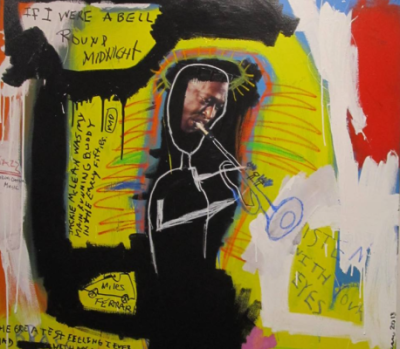
“The Clarion Sound of Miles Davis,” by Andres Chaparro
.
.
Regarding Miles: What I Liked & Did Not Like
Everyone adored his style.
The muted phase, the absent smile.
The virtuosity,
The devilishly handsome guy.
I loved his “Summertime”, “Sketches of Spain”,
Gil Evans’ name, Miles Davis’ freedom;
Starring in “The Nervous Set”,
(St Louis born), and staying at
The Landesmans whose first born son
Was named Miles Davis Landesman.
I loved his horn, the tone subdued,
Cried on the couch
At whose apartment house
I visited on hearing (once again)
“Sketches of Spain”,
“Porgy & Bess” and all the rest
Which brought me to my knees,
My forehead hot and freezing –
All emotions that exist
When listening to such genius.
The 50’s and the guys he hired,
Guys he fired, those who tired
Women jilted, music stilted:
Such a complex inner world,
Existence hurled at,
Both inspired and expired.
The revolutionary switches,
Those to which Miles Davis turned,
His restless mind adjourning
To a modern niche..at times the botches;
Phases I don’t not wish he chose,
Ones never yearned for: pop and blues,
Strange clothes and funk,
Some of it, in my taste, junk.
But on the other hand,
I do admire the man adaptive and
With flexibility; a stretchability we lack,
We, often holding back:
The same old track, as always.
Wealth, health, strength, stealth –
Days of Davis was in parts:
Drugs, music and the hearts
Of those he broke.
Such smudge and sludge is hard to judge.
It was a life of mire and smoke.
Its parts one can but like –
And not.
.
by Arlene Corwin
.
___
.
Kind of Blue
4 a.m.
waiting for a taxi
to take me away from you again
embers from the fire
smolder in the ash
where we sipped our tea
I raise my cup
and catch the scent
of catmint
on fingers
licked by the sandpaper tongue
of a feline junkie
a horn blows
not the taxi
but a soulful stir
pleading
go man go.
.
by Edward Sheehy
.
.
A musical interlude…Listen to Miles Davis play “Prayer (Oh Doctor Jesus)” from Porgy and Bess
.
.
.
Miles
Miles, you
probably knew
that there was
a new movement
for civil rights
coming,
especially since
you were always
ahead of your
time; ahead of
those people
who tried often
to box you in.
Your musical notes
spoke of freedom,
liberation. Liberation
and freedom is what
we still need. We need
your music now more
than ever brother, you
rebel, you Black activist!
Black activists all across
the country remember you.
We still play your albums.
We still identify with your
dark hue. Years after
you died we cry, we yell,
we scream Black Lives Matter!
Your music mattered, matters,
makes us move, impacts
moments, motivates, marks
time within time so we don’t
die slow deaths when death
it seems is all Black people
have left.
You won’t leave us though
Miles. Your music is always
a portal, is always the medium
between space and time.
We still vibe off of those
elevating notes. We Black
folks are in need of hope. We
fight, we march, we meet,
we cope with the craziness
of racism – all the while
realizing our dreams have
not come to reality.
When you blew your horn
stars were born across
neon skies to give rise
to new futures. Back then
and even now, you are
super Miles!
I can see you playing
at rallies. I can see you
organizing the best bands
who would play to beat back
at the wickedness of cops!
I can see you in the now
playing just to say stop,
stop, stop!
I can see you writing
new songs to collaborate
with true revolutionaries
in jazz and hip-hop!
Miles imagine yourself
on the frontline with
young people in the
millions practicing
movement-building
with Brown, Red, and
white people
because of all the
senseless killings;
because Black people
are dying, we are still
dying Miles
and the country is dividing
more and more. We need
a score written by you to
transform the times.
Your notes were ahead of
their time Miles. We can
use them now
to sing, to dance, to praise,
to create equity, to one day
achieve unity in this country!
.
by Christopher D. Sims
.
___
.
Jeanne Moreau Still Searching
Lonely On The Boulevard
she’ll forever come out of darkness
head to high heel fashionable
rambling elegant & forfeit
an interior loss absorbing her face
adrift down broad sidewalks
dimly lit from closed storefronts
bustling intersections crossed
heedless from disconsolation
disdainful of ever reaching the other side
in the sonic night a muted trumpet
backs a clashing cymbal tom-tom
tears swell
step by step
before an archly pungent sax
opens a flow
a stream
an exodus
of constraint
her songs
being the last seen leaving her heart
the music fades
…..(inspired by Ascenseur pour l’echafaud)
.
by Terrance Underwood
.
___
.
Miles
Yours is the sound of smoke
………….I love to inhale
……………………..the sound of a humid
…………………………………..summer night
…………………………………..it’s cool breeze
Yours the muffled sound
………….of brass along my life
……………………..of the hard streets
……………………..of the stage floor
The sound of a dark copper chest
Your voice makes gravel tumble
………….carefully, sparingly,
……………………..through your horn
Each note selected
………….to break our hearts,
……………………..to break our backs
……………………..to sift soul through
……………………..our midnight world
Yours is the embouchure
………….of struggle and triumph,
……………………..of blue and prince
……………………..of brew and bitch
.
by Charlie Brice
.
___
.
A Vocabulary For Miles
My old boss used to run errands
……………For Miles Davis. …..Laundry, things like that.
“The Prince of Darkness” he called him.
No. I’m not sure our vocabularies
……………………………………………………….work for Miles.
I remember going to an art exhibit of Miles’ paintings,
Thinking how unfair it would be if he was a genius twice.
Not to worry. He produced hobbyist stuff,
Signed with a Miles flourish: an eighth note!
Miles’ loud and sucky late-life music? ………………………It’s great!
Rolling funk, him listening to his band kids
Trying to impress him. …………….His face
Impassive, but I think pleased.
And gorgeous …………..melodies, like “Time After Time.”
Not… corny… at… all.
Miles once sat and played while a movie rolled,
Like the guy at the Wurlitzer………….. for a silent movie.
Music can be silent, he
knew. It can unspool
In millions of times and be heard ………………only by dogs,
Who remember it’s time to eat.
There isn’t much music that physically grabs me.
Heavy breathing, eye-rolling, jazz heart vocables.
Sketches of Spain. ……………….Jack Johnson.
They make ……….gravid prints on my blue-ish heart.
Miles knows what works. Bi-polar Jaco,
Mad on the streets, drunk, beaten to death.
Get ready to be forgotten!
Miles plays “Mr. Pastorius” when he’s
………………………………………………………………….barely gone.
And Jaco lives forever now.
Music is the tattoo on the soul.
Loud, or silent, …………………………..or muted.
A muted prince, a mutant, ………………….a communicant.
.
by Mark Fogarty
.
.
“Right Off,” by Henry Denander
.
.
Realizing Jazz
Sitting alone in the dark room, listening to the records of Miles,
I feel the lilac flow all around me with some philosophical noise,
I feel the flow and I trust it, I see now—
to find time—
we are joyfully realizing, that with this intangible second of finding,
a freedom is coming away from somewhere. This somewhere it’s not
a place but us, if we are free—we are at home.
.
…………………..(published in Jerry Jazz Musician, Jan. 14, 2018)
.
by David Dephy
.
___
.
When There Was Time
Miles was never in a hurry
wringing the clouds and rain out
of every note whether weather
came from his mind or his guts
moving air through his lips
arching his back, closing
his eyes, Miles ahead
rounding sound through his horn
from the inside out
time standing still.
.
by Victor Enns
.
___
.
Down With Miles, We Run The Voodoo
What springs to mind
when I hear Miles Davis’
Bitches Brew quintet
Live in Copenhagen (1969)?
Recorded reality
pop timed to April fool
the bitch’s feed this day.
In George Russell’s magnum opus
“Manhattan” Hendricks told
of “shortest jazz poem
ever written
nothin’ ’ bout huggin’
or kissin’
one word:
Listen!”
What Spirit causes all y’all to play
while hearing close each other
trekking music thickets,
sharing this with me?
I cannot say to,
I can just agree —
vivacious voodoo,
fleeting mystery —
All of us, together, listen.
Spirit sets us free!
.
by Catherine Lee
.
___
.
Kind Of Blue
…….[Listening to Miles ]
Feelin’ Kind of Blue.
Improvised textures,
made in heaven,
escape elucidation
and drift off
into the ethereal.
A cool melancholy
hovers, melodic,
creating a touch
of ineffable beauty.
Paring away
all embellishments,
we reach Jazz freedom —
the painful simplicity
of a single note.
.
…………………..(published in Jerry Jazz Musician, Feb. 3, 2021)
.
by Russell Dupont
.
___
.
Flamenco Sketches
Beautiful, colored space
Solitude, solace in evening’s sweet chamber
Late March, warm, a billow sweet ride
Miles wafting incandescence
Spanish harbors
Lit in firefly dreams
Flamenco dancer graceful as
A slo-mo gazelle in the Sevilla rain
Lady with a thousand fans
Painted crimson, emerald
Slow, sultry, red wrap around
And Barcelona breezes
Evan-escence traversing silk-alley utopias
Shades of peace..
Rising in daylight’s warm Spain flashes
True as any track ever laid, Trane
Saint Julien, exotic steps , and
A heart fills up with more love
Than Puerto Real could hold in orange outage twilights
.
by Michael D. Amitin
.
.
photo by William Gottlieb/Library of Congress
Charlie Parker, Tommy Potter, Miles Davis, Duke Jordan, and Max Roach, Three Deuces, New York, N.Y., ca. Aug. 1947
.
.
Daddy And Miles Davis
Daddy mirrored you,
the man who gave birth to cool,
carried your swagger
in the same effortless manner
when your smooth rhythms transfused
from the glossy black vinyl
through the HiFi stereo system
and three-foot speakers
into his eager cool-starved body
fingers popping, toes tapping
syncopated to the tempo
of your multilayered compositions,
no caricature or wannabe reproduction,
reborn clone fashion in the image
of your fresco, jazzed coolness.
Like a virus unchecked
whoever hears your music
risks the same transfiguration
into unmitigated cool cat coolness
just like Daddy
whenever he listened
to your jazz albums.
.
by Antoinette Winstead
.
___
.
For Always
When Cicely Tyson died recently
all I could think of was how
Miles had loved her so
despite his mistreatment
of her and himself
throughout their off again on again
sometimes maybe not romance
For always
And how much she loved him
even though
For genius is a curious and terrible burden:
So—did the horn demand
a sacrifice
Was his brilliant brain infected
with a malady that only a bitches brew
of heroin and women
and music and alcohol and cocaine
and more music
could soothe
Was this the price for
seeing feeling hearing that which
others did not
could not
hoping that someday someway
they too would be anointed
if he just played it
and played it
over and over
the dancing vibrating incessant juju
pounding in his soul
sounds and rhythms that might lead
to unmatched failure
utter disaster
OR
to the triumph of the
once unimaginable
now imagined
He pulled those wide-eyed players
around him
black white brown
and said Play this
and I’ll be there when I need to be
And they played
and he played
and it was alchemy
genius
For always
Sometimes I truly wonder
for whom he played
what audience he dreamt of
whose approval he craved
other than his own
and what notoriety he sought
that gave him the authority
to spew venom
back into the faces of
the clods and Philistines
ignorant and unschooled
the marketing execs
and bean counters
the promoters and critics
those who did not
care to feel, to comprehend
who were just annoyed
or just afraid of the onyx eyes
the fierce beautiful face
chiseled out of obsidian
that demanded they
Listen goddammit just listen
or get the fuck out of the way
Cicely was not afraid
She divorced him
but never left him
Of them all
she was the one
who saved him
who maybe understood
who could give
and then forgive
whose love was fiercer
even than his own
For always
.
by Bob Walters
.
.
A musical interlude…Listen to Miles Davis play “Moon Dreams,” from Birth of the Cool
.
.
The Good Life
We make love
So what?
We take hands everywhere
we go, especially in the
metro when we’re
about to leave each
other.
The Chinese food has
been on the table for
four days now,
no one noticed it,
we were too busy making love,
and so what?
Biting each other’s arms
and listening to Miles
Davis again and again
and again.
He just shaved his
beard because I asked him
to, and he looks completely
different but I don’t care
cause my baby just cares
for me and I just care
for him. With or
without mustache, I
can feel his soft lips
better that way, caressing
my cheeks…His perfume
mixes with mine
perfectly, like in a good duet
he plays the trumpet, I
play the cello.
Drank all the champagne,
ate all the food,
The more
we make love
the less we eat,
Listening to
Davis’ “Favorite things”
I’m a capricious child
We live the Good life
He smokes a cigarette
resting his elbow on my back,
we look at the night sky
through the open window,
a breeze..
We look at each other
as though there was
no tomorrow,
his devouring me
with words, with strokes,
with kisses.
We reach the
highest note and
it goes on and
on…
Doesn’t end.
And I rest against
his chest
forever…
.
by Claire Andreani
.
___
.
Lovely To Look At (by Miles Davis)
Your axe subdued
Flowing like French wine
Showing off just because you
Quietly can
Miles beyond all of us
Lovely to look at
Delightful to hold
Syncopated complexity
Sax and piano
Max brushing
Certainly all of that
Max sticking it now
But you, Miles,
Muted craziness
Not now beating
No women
That irresistible horn
Delightfully cold
Too old to be bold
Exhaling purely
feverish gold.
.
by Ed Coletti
.
.
Portrait of Miles Davis by Vakseen
.
.
On A Tashkent Winter Night
Midnight snow blows
across the street lamp
…………..cool as the bodies
…………..in the morgue
…………..of the military hospital
…………..just across the street
and I hear Concierto De Aranjuez
floating dimly through memory’s walls
…………..and remember a rainy Clark Air Force Base
…………..afternoon in the sixties, getting some rack time,
…………..sweating in the humidity, stripped
…………..to shorts, chilling to Miles one barracks bay over.
Outside the snow grows in volume;
Miles wavers in and out, a radio beacon
…………..from the past, distorted by static
…………..of the years between.
The snow tumbles, floats, falls into memory, blends
with the cool blue river of Miles, Miles, Miles.
……………………………………………Uzbekistan, 1998
.
……………Previously published in Traveling without Compass or Map (Bellowing Ark Press, 2006).
.
by Michael L. Newell
.
___
.
Gold On The Mississippi
It is not unimportant that Frederick Seidel is from
St. Louis. It is significant that so were Ike and Tina Turner.
It is important, too, that T.S. Eliot was a St. Louisan.
And let’s not forget Miles Davis, across the river.
We knew they could play baseball in St. Louis, but
who knew they could write poetry? We knew they
could play bongos, but who thought they could blow?
It was up to Hearst to spread the news.
The Seidel coal miners preferred their liverwurst with
onions. The Eliots were men of the pulpit. Thank God,
young Tom was listening. Even Miles got the message.
It is all in the rhythm and blues. It comes from the river.
Word gets around of the words being spun around.
Seidel says he finds them in the ground like coal. He digs
in the same vein as D.H. Lawrence, another minor miner.
Miles Davis says he can dig it, but he is just tooting his horn.
These players were born in river water, found on the river
bottom, living like catfish, searching for those little mice,
the ones who learn to scatter: cats on the go. These cats
have rhythm and an instinctive ability to count.
Rhythm and blues: products of that river boat town. Sweet
Anna Mae arrived by boat from Memphis. Tom and Miles
were drawn to the river traffic. Tom took the next boat over-
seas to England. Miles, to Manhattan, and without delay.
Thomas Stearns Eliot and Miles Davis might be gone but
Tina and Frederick Seidel still play the trumpet. There are
horns aplenty. At eighty-plus, they call to the next generation.
All we know is they are to be found down by the river.
.
by David Lohrey
.
___
.
The Meaning of the Blues
Only in Pittsburgh
do the dead walk backwards
on their way to work every morning
like Miles
who used to play
with his back to the audience
and cuss so only God could hear
that’s just the meaning of the blues he used to say
you can’t use plain English
.
by John Stupp
.
___
.
7.59
From the recording Miles & Coltrane, Newport Jazz Festival
– Fourth of July, 1958
…….At the 7.59 mark of “Straight, No Chaser,” during Paul Chambers’
bass solo, one of the musicians coughs and it can be heard
clearly over Paul’s solo.
……..“The reward for playing jazz is playing jazz.”
……………………………………………………………….– John Lewis
.
One second before the clock
strikes the end of the minute,
a small itch at the back of the throat
can be heard,
a little one-note burst,
an improvised human sound
that demands to be uttered,
a cough, though cough
may be too strong a word.
It’s sounds more like
the way a quarter-note looks,
the smallest push of voice
placed amid a crowd of sound,
and entirely necessary.
And who was it
who had the unstoppable urge
to express that sound?
We know it wasn’t Bill –
he was nattering with the piano,
with blind clarity,
with something like trust,
while the others were where
thought enters breath,
weaving firey synapses
into a language in the air
that we cannot speak
yet we understand, intangible,
and as beautiful and impossible
as a mockingbird atop a pole,
a little whole-note
taking in everything around him
and making it his own
with all the precious breath
he can gather,
playing it into the air,
which makes it all worth it,
which makes it all disappear
I’m taken by the casualness of the cough,
its accessibility —
while the rest of the band
converses in verses
of invented direction,
oblivious of their destination until they arrive,
one stopped along the way
for an unadorned expression,
a connection with the listener
as vital as the humanity
which surrounds us,
and though I cannot recall how jazz
entered my veins,
I do remember high school hallways
where kids sang I Want to Hold Your Hand,
while I hummed Monk’s Dream,
learning to make up my life
as I went along.
.
…………..(originally appeared in the Peacock Journal)
.
by John L. Stanizzi
.
___
.
Audio Visual
…………………….regarding Miles Davis
hearing his body movement happen
………………………………sight unseen
from a “live” audio recording clean
Miles his back to a cocktail crowd
mumbling through his prelude loud
until a finger snaps precisely when
with a spin turn heel’n’toe & then
straightens to a stare that effaces them
& breathes muted melody into
………………………………fabricated brass
to silence all murmur ice & glass
.
by Terrance Underwood
.
___
.
Sweet Notes
crossing streets
and rivers
over mountains
through jungles
surrounded
by blue oceans
around corners
of buildings
tall and squat
through deserts
cold and hot
past palms
and angry dogs
into cities
big and wide
in windows
out windows
past trees
with leaves
the pulse of
his jazz
has no
hold when it
sends out
those sweet
notes
.
by Roger Singer
.
.
“Blue in Green” by Paul Lovering
.
.
Mind/ful/l
of Miles
What’s new?
I too
am kind
of blue,
ear buds
soothing
“So What,”
Chambers
and then
Evans
noodling
Gil E.’s
intro.
Sooo what?
Upright
walks in
the tune,
conjures
modal
three-part
sooo what’s.
No mute
for Miles,
just cool,
crystal-
clearful
riffing.
Sooo what?
Coltrane’s
tenor
takes me…
Jimmy’s
brushing
behind.
Sooo what?
Cannon-
ball’s break
before
more Bill,
then back
as one:
Sooo what?
B-dah
b-dah-
b-dah
b-daaah:
Sooo what?
B-dah
b-dah
b-dah.
b-dah
bah:
Sooo what?
B-dah
b-dah-
b-dah
b-daaah:
Sooo what?
B-dah
bah-bah-
baaah:
Thaaa’s what.
…………..(first published in Galway Review, January 27, 2018)
.
by D.R. James
.
___
.
So What, Kind Of Blue
Traffic glides by outside in the avenue;
days fall off the calendar like lemmings
and it’s the end of the Fifties . . .
Bay of Pigs is just two years away;
JFK won’t be assassinated for four years;
the Summer of Love is still eight years away;
the Grateful Dead hasn’t formed yet, and
the Manson murders are a decade away.
Jackson Pollock’s paintings are mixing it up
in art circles, focusing our attention on
the beauty of roadside bramble and weeds.
Jack Kerouac’s On the Road has made
it to mainstream, and he is on TV with
Steve Allen accompanying him on piano.
In the studio at Columbia in NYC,
Miles, Coltrane, Cannonball, and
Bill Evans, Wynton Kelly, Paul Chambers,
and Jimmy Cobb are recording the jazz
equivalent of Sgt. Pepper’s— in 1959.
So what? It’ s kind of blue, isn’t it?
Genius takes on form of the previous unknown;
chemistry comes together in lightning touches
of brush strokes, notes, finger taps, and swishes.
.
by DH Jenkins
.
.
A musical interlude…Listen to Miles Davis play “Miles Runs the Voodoo Down,” from Bitches Brew
.
.
If I Could Write A Book
Sally lit another Marlboro
………….stared at her Smith-Corona
………….drank sweet Passover wine
………….broke her writer’s fast on Kingsbridge Road
Her Elijah never came
………….dumped her for a Scarsdale beauty
………….with youth & class
Alone at the age of thirty-five
………….her brain cells & sexuality craved attention
The RCA turntable in motion—
………….fingers pounded to the beat & heat
………….of Miles Davis & his quintet
Like the song
………….if she could write a book she would
Keys couldn’t keep up with Miles & his band—
………….her past & present didn’t make sense
………….nouns argued with pronouns
………….verbs cried for help
………….& adverbs were nowhere to be found
Ideas gone askew
………….paperback nonsense
………….scattered by her feet
She finished her wine
………….put out her last cigarette
………….said good night to Miles & his quintet
………….ripped her unfinished page
………….from the Smith-Corona
………….before turning off the light
.
by Patricia Carragon
.
___
.
miles davis’ flamenco sketches
tender blue miles
traversed
languid miles
luxuriant
in the pauses
no hurry at all,
miles above
with bird
soaring —
gliding piano
ever so slowly
striding sliding
comet across
dark blue inky
sky
este piano
como una guitarra
a través del cielo
antes de la luna creciente.
.
by Ed Coletti
.
___
.
My Funny Valentine
The first flat of my own in Stockholm was
really small but in a nice area on one of
the islands south of the old town.
My girlfriend often stayed with me,
since her own flat was way out
in the suburbs.
The two of us never rang the
doorbell but used
the squeaking mail slot in the door;
when it was opened slowly it made a sound that
could be heard in the flat
and made you rush to the door.
You knew who was there.
Years later, we have been
married for some time,
having dinner in our new flat
listening to a recording of
Miles Davis
playing at Philharmonic Hall in New York
in 1964.
My Funny Valentine
Suddenly, half way into the song,
we both look up and listen,
Miles Davis is improvising and
playing a
long
single
note
the exact
tone
of that
squeaking mail slot
We smile
and feel proud
to share
this small secret
with Miles.
.
…………………..(published in Jerry Jazz Musician, Feb. 13, 2021)
.
by Henry Denander
.
___
.
Miles Ahead
the ocean lies, as i walk
pretending you are with me
and this moment is bluer
than any dream i could have
a moment not even a trumpet
could capture
you hide your true self, hiding behind
glasses,i never knew you
in tones of night, miles’ horn
dressed you
in the light, i undress
you
you are a poetry of blues and green
i knew one day, you would get the
better of me
of so it seems
but i spend the day with you
undercover, under an umbrella
no pretenses, just
a kiss from you
and a silent way, leads me
to an everlasting
peace
even if it only a dream
.
by Erren Kelly
.
.
“Miles Davis,” by Fred Jourdain
.
.
Miles
In five notes
….all the sadness of life
A pause___
long enough
….for another sorrow
….….to slip in
And then___a note so piercing,
….it hurts
.
by Susandale
.
___
.
Cool cat with a horn
Miles Davis was
the original cool cat
who created Birth of the Cool
and ‘Round about Midnight
before grooving it
with Coltrane
in Stockholm.
So What—
He did it all!
Kind of Blue,
Sketches of Spain.
Bitches Brew, etc.
He was The Man with the Horn,
bewitching everyone speechless
as his trumpet sang true
for over 50 years.
.
by Carrie Magness Radna
.
___
.
Adrift In Evening
twilight fades with grace and elegance
of muted trumpet solo’s last notes
drifting into memory for example
the evanescent sorrow of notes
blown by Miles Davis using a Harmon
mute where the final sounds are
a mere whisper yet contain a lifetime
of grief hope and wistful surmise
so too evening’s last wisps of light
contain long departed ocean voyages
athletic and academic feats now
barely credible and vanished lovers
a hint of their smiles the sound
of their voices in night’s solitude
caught in last echoes of birdsong
and the lost beauty left behind by Clark Terry
Dizzy Gillespie and Miles always Miles Davis
.
by Michael L. Newell
.
___
.
Film: Ascenseur pour l’echafaud
……………….(for Miles Davis and Jeanne Moreau)
Play your horn under the foggy lamplights
of Pont Mirabeau. 52nd Street’s far away
in the blue of 1958: bebop, cops
and neon signs in the rain.
Our Lady gently weeps
bells over the Rue de Seine.
Scene: A phone rings. “O Je t’aime!”
Click! The gendarmerie are coming to get them.
A car chase and the trumpet
makes its getaway, breathless.
He appears more mysterious
seen through the smoke of a jazz club,
she shimmers on screen
like the moon in the pool of Narcissus,
and we look on all broken-hearted in French.
.
by Gary Jude
.
___
.
Miles Davis Plays “Blue In Green”
His exploring
………………………pensive mood
suits this snowy dusk
the sound of the river cascading
over icy rocks …..floes
breaking free.
His trumpet
…………………sings a melody
lilting …dancing… falling
breaking into low spaces
poignant with loss
………………………………..or longing.
It seems he mirrors the river
or the river mimics his modal-
making improvisation.
You’d like rum splashed
over rocks …..a taste of Cuba
the rocking of a sloop
days lost to sun and sailing
body lithe and strong….. not
this profound awareness
of dissonance within
making improvisation
impossible.
Miles had his demons too.
Listen ……you can hear them
waking just below
the surface.
The river’s obsessive race
to the sea continues.
The cd spins.
Your body relaxes
under morphine.
I listen to the melody
feel the pulsing disharmony
the silken colour of wounds.
.
by Kathryn MacDonald
.
___
.
Kind Of Blue
…………….—Miles Davis (1959)
Those tunes sieved the cataract of voices
pummeling a shrapneled consciousness. Blues
turned skeletons into truths; five modals
immuned me to metronomes of collapse,
mercurial spans,mourning’s corrosion.
Piano, doubled-up sax, snare, bass, and
muted trumpet (always trumpet, always
Miles emitting drowsed webs, palmed filaments,
space-between intricacies, heresies
of feeling) dismissed that lair’s garrison.
.
by D.R. James
.
.
Portrait of Miles Davis by Vakseen
.
.
Christmas Alone 1992
The slow tumble of snow past
my partially open window
recalls the year in Amman
I sat for hours watching
a bleak whiteness deepen
all through the abandoned farm fields
surrounding my apartment
while the cool sound of Miles
gave shape and form to my grief
thousands of miles from home
on a frozen Christmas where no one
could be seen on streets or through
windows of neighbors’ homes;
distant cars on the far side of
empty fields seemed like toys
moved in slow motion by children;
a quiet breeze drifted through
a cracked window to fill the silent
spaces in Miles’ solos,
and my small dog softly snored
a guttural accompaniment, a peculiar
percussion, and I rocked and nodded
as I kept time to the snow, wind,
dog, and muted trumpet;
the windows moaned in response
to an occasional gust; all visible
and invisible seemed alone, and the years
locked in memory came tumbling out
like snowflakes blown by wind,
like a trumpet solo etched into sound
by a musical genius; it is odd how grief,
stark landscape, falling snow, and a mournful
trumpet solo could seem a blessing that created
beauty, that guided a listener to sleep’s peace,
as night seeped across fields, enveloped my mind.
…………………………………..Khilda, Amman, Jordan
.
by Michael L. Newell
.
___
.
Autumn Leaves: Miles Davis
That inner sense of freedom,
a natural balance
with an impulse
to preserve the day,
as the equinox
tilts from a window
with a view of leaves on fire.
The cycle of blues
in a public park,
the elegant air exposed
as fashions parade
with future notes on display.
The fields of funk,
his purity of sound
penetrating early morning streets
heightened by a full October moon,
an instinct for movement
travelling towards
a jazz of universal light.
.
by Byron Beynon
.
___
.
Solo (Miles Davis)
Out of the bell
of the trumpet
comes the little cortege
of a jazz
funeral,
a zooted pimp
puffing weed,
a matador
bleeding badly
and a bull
coughing
up its lungs.
A troupe of harlequins
cartwheeling
slow blue circles makes us cry.
Suddenly they run amok and throw
cream pies. There’s almost a riot.
We clap madly. The cops are called,
and we bounce like pinballs
down 52nd Street’s electric neon night.
.
by Gary Jude
.
___
.
Doo-Bopping with Miles
8:00 a.m. grooving to Chocolate Chip
Oh shit! Got me making moves I didn’t
know still existed inside of this old girl
rocking to the man, his trumpet transcending
a wave from my head to my shoulders
working down my spine, my hips gyrating
back to a jazzy motherland, working
it to Blow, how low can I go, my
hand up in the air, like I just don’t
care, Miles, transferring me into
Sonya, biting my lower lip, ain’t
this a trip, what galaxy is this
lost in a Fantasy, ain’t no Mystery
Miles done got a hold of me
With his doo-bop, mystic energy
.
by Aurora M. Lewis
.
.
photo by Francis Wolff/© Mosaic Images
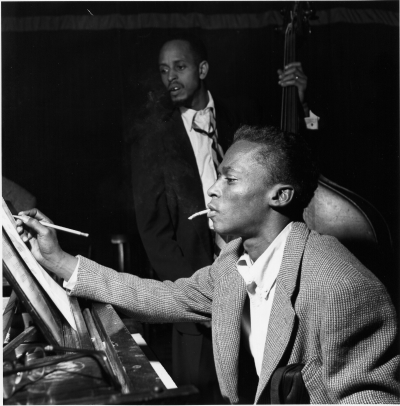
Miles Davis with Percy Heath at a rehearsal for the “Miles Davis All Stars” second session, NYC, April 1953
.
.
Papa Meets Miles In Spain
………..A Dangerous Summer in the Sketches of Spain
Passing by the misty mountains of Spain
to under the tender arms of chestnut trees
Papa is off to Fiesta
Meanwhile, Miles wanders through
the shadows and lights of Madrid’s
lush gardens
A long, slow pass with the cape,
a cuadrilla, is accompanied by
Miles’ melancholy memories
of yesterday’s bewitching love
Miles’ song hangs in the air
until the Pan Piper announces the encierro
In Pamplona, Papa waits on his balcony
to watch the bulls charge forward
While within the cathedrals and missions of Spain
vigil lights flicker
And the triumphant trumpeter
rounds the bend to a full house
where
he clicks and clacks flamboyant flamencos
before he
tiptoes around the bend
to fall into the long silence
of a muleto
folded and doubled over
for another day’s Fiesta
.
by Susandale
.
___
.
Crepuscule
I’d love to hear Miles’ interpretation of Gymnopèdie,
Satie’s matutinal sound made crepuscular.
That time of day when the sun lies low,
Dissolving into dusk.
Notes bubbling up to your brain,
Fizzing with feeling,
Motivated by mood,
Relaxing with restlessness.
Relentless in ambience,
Cigarette pulsing in the dark,
A long way from where you were,
Closer to where you’re going,
Where you want to be,
Out there,
Deep within.
Feeling a kind of blue.
.
by Anthony Ward
.
___
.
Blue Shadows in the Street
When I hear Miles Davis,
master of the Harmon mute
and the melancholy note
play down cool
kind of blue
sketches of Spain
dear old Stockholm
time after time
blue in green
after a heavy rain
I am
1 lone figure
in blue raincoat
walking down a night alley
1 a.m.
casting blue shadows
across the puddles.
.
…………………..(published in Jerry Jazz Musician, May 12, 2020)
.
by Craig Smith
.
___
.
Miles and Miles
His mellow moods
were all emotion—
love songs,
heart melodies
that we could dance slow
or cuddle to— feeling
filtered through
intellect.
Later,
mood morphed,
anger exploded,
rampaged, ranted.
Frenzied feeling
flared, blasted
the tops of our heads
off.
.
…………………..(published in Jerry Jazz Musician, Feb. 17, 2020)
.
by Phyllis Wax
.
___
.
A Small Request
Deep blue of Miles’ horn floats through silent night,
Where only light is shawl of stars wrapped round dark clouds.
Miles’ trumpet makes listeners’ hearts take flight.
Deep blue of Miles’ horn floats through silent night.
His songs sail with owl in soaring flight.
Such beauty is my request for my shroud.
Deep blue of Miles’ horn floats through silent night,
Where only light is shawl of stars wrapped round dark clouds.
.
by Michael L. Newell
.
.
.
_____
.
.
.
Poets contributing to this collection (listed in the order in which their poems appeared)
.
.

.
Susandale’s poems and fiction are on WestWard Quarterly, Mad Swirl, Penman Review, The Voices Project, and Jerry Jazz Musician. In 2007, she won the grand prize for poetry from Oneswan. The Spaces Among Spaces from languageandculture.org has been on the Internet. Bending the Spaces of Time from Barometric Pressure is on the Internet now.
You can reach her by email at [email protected]
.
.
___
.
.
Michael L. Newell is a retired English/Theatre teacher. He has a new book of jazz poems, Diddley-Bop-She-Bop, coming soon from Bellowing Ark Press in Seattle.
.
.
___
.
.

A native of Maryland’s eastern shore, Joel was educated at the University of Maryland Eastern Shore (B.S.) and Rowan University (M.M.). He is the organist and choir director at First Presbyterian Church in Ocean City, MD. He can be reached at [email protected]
.
.
___
.
.
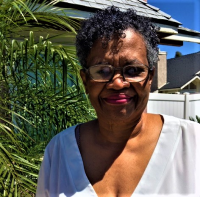
Aurora M. Lewis.is a retiree having worked in finance for 40 years. In her fifties, she received a Certificate in Creative Writing-General Studies, with Honors from UCLA. Aurora’s recent poems, short stories, and nonfiction have been accepted by The Literary Hatchet, Jerry Jazz Musician, The Blue Nib, Trembling in Fear, Jitter Press, Scary Snippets, Copperfield Review to name only a few.
.
.
___
.
.
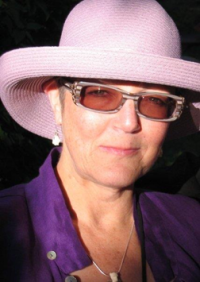
Judith Vaughn lives in Sonoma, California. She attended New York City College, John F. Kennedy University, and Dominican University with a focus in Psychology. She has written poetry since her childhood and a jazz fan since her late teens. Her work has been published in First Literary Review-East an online literary publication; Oak East News, a student publication at SRJC, in Santa Rosa, CA. She is also a photographer. Photo images: 500px.com/judithjudith1
https://judithjudith.tumblr.com
.
.
___
.
.
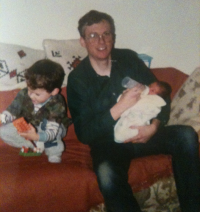
John Stupp’s third poetry collection Pawleys Island was published in 2017. His manuscript Summer Job won the 2017 Cathy Smith Bowers Poetry Prize and was published in August 2018. A chapbook entitled When Billy Conn Fought Fritzie Zivic was published by Red Flag Poetry in January, 2020. (From 1975-1985 he worked professionally as a mediocre jazz guitarist). He lives near Pittsburgh, Pennsylvania and can be reached via email at [email protected].
.
.
___
.
.
Freddington works as a shipper/receiver in Toronto, Canada, and has been a lifelong jazz fan ever since he was “corrupted” as a teenager by Charles Mingus’ “Wednesday Night Prayer Meeting.”
.
.
___
.
.

DH Jenkins worked as an associate professor of English/Speech for the Univ. of Maryland in Japan and Korea for many years. His jazz play, Ti Jean, about Jack Kerouac, has been staged in Tucson, AZ and in St. Joseph, MO. Thirteen of his poems are set to music in the film Call From a Distant Shore, a collaboration with musician/artist Bill Scholer, June 2020.
.
.
___
.
.
photo by Donna Termini

David Dephy is a Georgian/American award-winning poet. The winner of the 2019 Spillwords Poetry Award, the finalist of the Adelaide Literary Awards 2019 for the category of Best Poem. He was named as A Literature Luminary by Bowery Poetry and The Incomparable Poet by Statorec. His works have been published and anthologized in USA, UK and all over the world by many literary magazines, journals and publishing houses. He lives in New York.
.
.
___
.
.
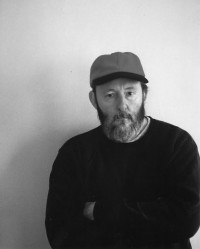
Russell Dupont is an artist and an author whose artwork is included in a number of public and private collections. He has published two novels, King & Train and Waiting for the Turk; two books of poetry; and two non-fiction chapbooks. His essay, “The Corner,” is included in the anthology Streets of Echoes. His work has been published in various newspapers and literary magazines. He was the founder & publisher of the literary magazine,.the albatross.
Visit his website by clicking here
.
.
___
.
.

Charles Joseph Albert writes poetry and fiction in San Jose, California, where he also performs with the South Bay Bones. His work has appeared recently in Spectrum, In Parentheses, and California Quarterly, and a new collection, Confession to the Cockroaches & Other Poems is available on Amazon.com.
.
.
___
.
.
photo by Blair Hopkins

Amy Barone’s latest poetry collection, We Became Summer, from New York Quarterly Books, was released in 2018. She wrote chapbooks Kamikaze Dance (Finishing Line Press) and Views from the Driveway (Foothills Publishing.) Barone belongs to the Poetry Society of America and the brevitas online poetry community. She lives in NYC.
.
.
___
.
.

Fred Shaw was named Emerging Poet Laureate Finalist for Allegheny County in 2020. He is a graduate of the University of Pittsburgh, and Carlow University, where he received his MFA. He teaches writing and literature at Point Park University and Carlow University. His first collection, Scraping Away, was recently published by CavanKerry Press. He lives in Pittsburgh with his wife and rescued hound dogs.
.
.
___
.
.
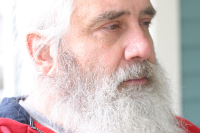
John Riley has published poetry in Mojave River Review, Smokelong Quarterly, Connotation Press, Dead Mule, Better Than Starbucks and many other journals and anthologies. He works in educational publishing part-time and is a full-time nanny to his granddaughter Byl.
.
.
___
.
.
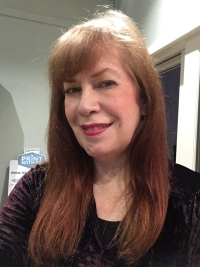
Patricia Carragon’s poem “Paris the Beautiful” won Poem of the Week from great weather for MEDIA. Her fiction piece “What Has to Happen Next” is nominated for Sundress Publications Annual Best of the Net Anthology. Her latest book from Poets Wear Prada is Meowku. Her debut novel, Angel Fire, was just released by Alien Buddha Press. Patricia hosts Brownstone Poets and is the editor-in-chief of its annual anthology. She lives in Brooklyn, NY. She can be reached via email at [email protected]
.
.
___
.
.

Kristofer Collins is the books editor for Pittsburgh Magazine. He is the author of several poetry collections, most recently. Salsa Night at Hilo Town Tavern.published by Hyacinth Girl Press. He lives in Pittsburgh, PA with his wife and son.
.
.
___
.
.
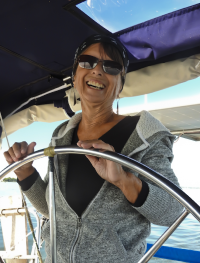
Kathryn’s poems have appeared in literary journals in Canada, the U.S., Ireland, and England. Her poem “Duty / Deon” won Arc Award of Awesomeness (Arc Poetry Magazine, January 2021). “Seduction” was shortlisted for the Freefall Annual Poetry Contest edited by Gary Barwin. “Seduction” was published in Freefall (Fall 2020). She has poems forthcoming in The Beauty of Being Elsewhere, an anthology edited by John B. Lee.
Website: https://KathrynMacDonald.com
.
.
___
.
.
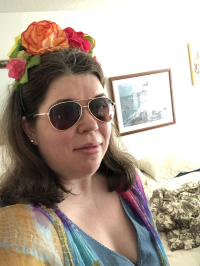
Born in Norman, Oklahoma, Carrie Magness Radna is an audiovisual cataloger at the New York Public Library, a choral singer and a poet who loves traveling. Her poems have previously appeared in The Oracular Tree, Muddy River Poetry Review, Poetry Super Highway, Walt’s Corner, Alien Buddha Press, Cajun Mutt Press and First Literary Review-East. Her new poetry book, In the blue hour (Nirala Publications) is now published! (Find it on Amazon.com and SPD.com)
Visit her blog by clicking here
.
.
___
.
.
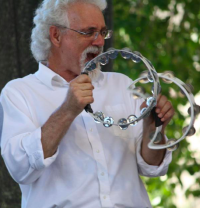
Bob.Walters.grew up in the bayou country of East Texas. After graduating from West Virginia University, he has spent the last few decades teaching Literature, Writing, and Creative Writing in Asheville, NC, where life is good and music is wonderful. He also plays drums in a blues and soul band, writes fiction and poetry, and paints to calm a restless spirit. He is married to his favorite person, and they have three large sons.
.
.
___
.
.
photo Roger Gordy

Steve Paul, a onetime jazz DJ and critic, retired from daily journalism after a career of more than 40 years and segued into literary and cultural biography. He’s the author of Hemingway at Eighteen (Chicago Review Press, 2017) and a forthcoming biography of the writer Evan S. Connell. His occasional columns on jazz topics appear in KC Studio, a regional arts magazine.
.
.
___
.
.
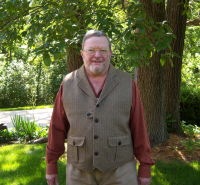
Alan Yount, 72, has published poetry for over 50 years. His poems have appeared in WestWard Quarterly (featured poet for summer, 2018). Big Scream, Spring: the Journal of the E.E. Cummings Society, and Waterways.
He has been in three anthologies: Passionate Hearts, Sunflowers.and Locomotives: Songs for Allen Ginsburg. Alan was one of 31 poets, along with Gary Snyder and Lawrence Ferlinghetti. Also Chrysalis Reader.
Alan plays trumpet and has led his own dance band.
.
.
___
.
.

R. Bremner has been writing since the 1960’s. He appeared in 1979’s first issue of Passaic Review, along with Allen Ginsberg and Rich Quatrone. International Poetry Review, Oleander Review, Paterson Literary Review, Red Wheelbarrow, and.Shot Glass Journal.are a few of the journals he has been in. Ron has won Honorable Mention in the Allen Ginsberg Awards, and has published six print books, including.Ektomorphic(Presa Press), and thirteen eBooks.
.
.
___
.
.
photo by Jack Underwood
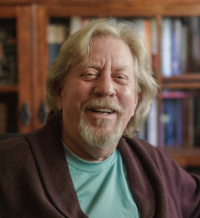
Terrance Underwood is a retired Rolls-Royce Service Engineer, veteran, College Grad (B.A. History) who has been listening to recorded jazz music since he was 5-6 yrs old. One of his first memories is listening to a 78 version of “Cherokee” by Charlie Barnett.
.
.
___
.
.
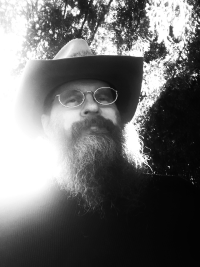
Frank Wilkes lives in the Santa Cruz Mountains of California. He enjoys writing poetry and composing mellow music. His work has been published in The New York Quarterly, On The Bus, Slipstream, and the Santa Cruz Good Times Weekly, among others.
He can be reached at [email protected]
.
.
___
.
.
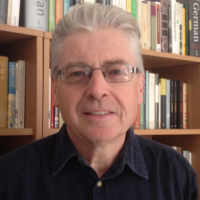
David Cooke’s latest collection of poetry, Sicilian Elephants, will be published by Two Rivers Press in November 2021. He is the founder of the UK-based online literary journal The High Window, which he founded in 2015, and which can be viewed by clicking here
.
.
___
.
.

Ed Coletti is a poet, painter, fiction writer and middling chess player. After graduating from Georgetown University, he served for three years as an Army Officer, then as a Counselor and later as a Small Business Consultant. He was a student of Robert Creeley’s in the graduate creative writing program at San Francsico State. Recent poems have appeared in ZYZZYVA, North American Review, Volt, Spillway, and Blueline. Most recent poetry collections include The Problem With Breathing (Edwin Smith Publishing –Little Rock- 2015) and Apollo Blue’s Harp And The Gods Of Song published by McCaa Books February 2019.
.
.
___
.
.

P.W. Bridgman’s first book of poems, entitled A Lamb, was published by Ekstasis Editions in 2018. A second, entitled Idiolect, is due from the same publisher in June 2021. Bridgman’s writing has appeared in Jerry Jazz Musician, The Maynard, Grain, Moth Magazine, Antigonish Review, Glasgow Review of Books, The Honest Ulsterman, Galway Review, Ars Medica, Bangor Literary Journal, Crossways Magazine, The Idler and other periodicals and anthologies. You can learn more by visiting www.pwbridgman.ca.
.
.
___
.
.

John Kendall Hawkins is an American freelance writer currently residing in Australia. His poetry, commentary and reviews have appeared in publications in Oceania, Europe, and the US. He is a regular contributor to Counterpunch magazine. He is a former winner of the Academy of American Poets prize. He’s working on a novel.
.
.
___
.
.
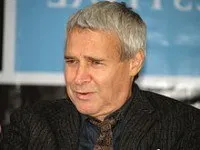
Steve Dalachinsky was a New York downtown poet active in the poetry, music, art, and free jazz scene. His main influences were the Beats, William Blake, The Odyssey, obsession, socio-political angst, human disappointment, music (especially Jazz), and visual art with leanings toward abstraction. His work has appeared frequently in Jerry Jazz Musician, and now with the consent of his wife, the painter and poet Yuko Otomo. He passed away in September, 2019. He was 72 years old.
For a complete biography, visit his Wikipedia page.
.
.
___
.
.
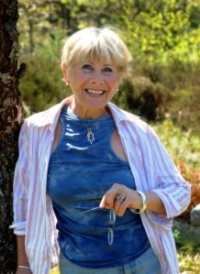
Arlene Corwin…Brooklyn born. Age 85. Harpist, pianist, singer. High School of Music & Art. Hofstra Univ. BA. 2 films (lead in one, composer in the other — see IMDb) original lead in “The Nervous Set, introducing “Spring Can Really Hang You Up the Most”. 19 published poetry books, yogin since the age of 20-something. Lives in Sweden. Jazz musician forever. Mother owned jazz club, The Turf with Slim Gaillard in the 50’s, Hempstead, Long Island. (See.Arlene Corwin. Poetry.com .for longer version.). See Youtube for Arlene and some good tunes.
.
.
___
.
.
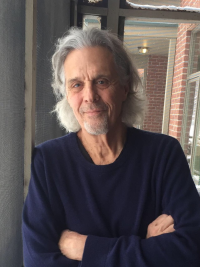
Edward Sheehy is a writer and occasional poet in Minneapolis. He lives on the west bank of the Mississippi River.
.
.
___
.
.
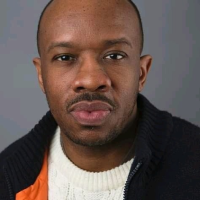
Christopher D. Sims is a writer of poetry, a spoken word artist, and a human rights activist who uses words to inform. Born and raised on the west side of Rockford, Illinois, he has been writing since he was nine years old. A published poet, Christopher wrote a poetry and memoir collection entitled I was Born and Raised in The Rock in 2020. He is a fellow of the Intercultural Leadership Institute.
.
.
___
.
.
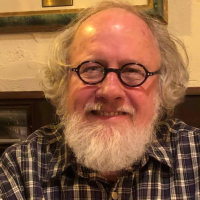
Charlie Brice won the 2020 Field Guide Magazine Poetry Contest. His chapbook, All the Songs Sung (Angel Flight Press), and his fourth poetry collection, The Broad Grin of Eternity (WordTech Editions) arrived in 2021. His poetry has been nominated for the Best of Net Anthology and three times for a Pushcart Prize and has appeared in The Atlanta Review, Chiron Review, The Paterson Literary Review, The Sunlight Press, Sparks of Calliope, and elsewhere.
.
.
___
.
.

Mark Fogarty is a poet, musician and journalist. He curates The Jaco Pastorius Gig List on Facebook
.
.
___
.
.

Victor Enns reads and writes poetry and fiction. He lives in Gimli, Manitoba, Canada. His first jazz show was Count Basie, with the Count still at the piano, at the old Civic Auditorium in Winnipeg. Some of these poems are appearing in a new book called Love & Surgery, published September 2019, by Radiant Press in Regina, Saskatchewan. Afghanistan Confessions, poems in the voice of Canadian soldiers, was published in 2014, boy in 2012. Lucky Man (2005) was nominated for the McNally Robinson Manitoba Book of the Year award.
His poems have appeared in Canadian publications and including Rattle (print) and Shot Glass Journal (online) in the U.S. His most memorable performance this century was a mainly Mingus show led by Toronto bassist David Young (originally from Winnipeg) with an eight piece band at the Rex in Toronto.
.
.
___
.
.
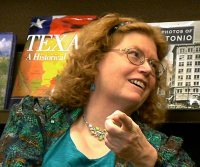
Catherine Lee reads solo and performs with improvising musicians “on poem” when she can. Five of her annotated jazz-related poems were featured in the July 2020 “Music” Issue 5 of Northampton Poetry Review, pages 63-74. Her multimedia poetry, documentary videos, and radio specials are archived on Soundcloud and VIMEO. Find artist-handmade, numbered, limited edition chapbooks (We Free Kin and A Rested Development) with music CD at Jazz-Ovation-Inn.com.
.
.
___
.
.
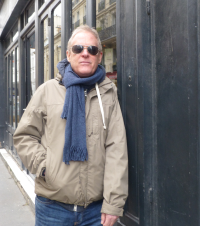
Poet and musician Michael D. Amitin, originally from California, traveled the roads of the American West before settling in Paris, France where he now lives. Recently named International Beat Poet Laureate 2020-2021, Amitin’s poems have been published in California Quarterly, Poetry Pacific, North of Oxford. Love Love Magazine. and others. A current collaboration with Parisian photographer Julie Peiffer has given rise to the “Riverlights” project, and can be found at Riverlights.art
.
.
___
.
.

Antoinette F. Winstead is a poet, playwright, director, and actor living in San Antonio, Texas, where she’s a professor at Our Lady of the Lake University. Her poetry has appeared in several publications, including The Woman Inc., Texas Poetry Assignment, Voices de la Luna, Langdon Review, Texas Ballot Poetry, and The Poet Magazine. Her poem “JAZZ” received First Place for the 2020 Persimmon Prize. She is currently President of the Alamo Area Poets of Texas.
.
.
___
.
.
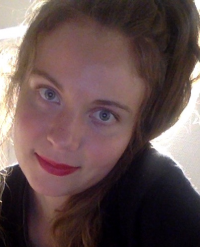
After having completed her first years of Masters in American Literature at la Sorbonne and her second year of Masters at New York University, Claire Andreani started writing poetry, focusing her work on Emily Dickinson, E. E Cummings and Wallace Stevens. She is currently working on a collection of poetry called the city, exploring the absurdities and transformations imposed by Modern Society: how city life reflects in Human Nature and changes it.
She can be reached via email at [email protected]
.
.
___
.
.
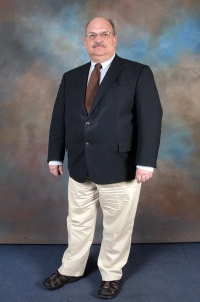
David Lohrey’s poems can be found throughout the US and the UK, esp. at Expat Press, Terror House, and Jerry Jazz Musician. His poetry has appeared worldwide, most often in Australia, Ireland, the Netherlands, Malawi, and India. His fiction appears in Eclectica, Storgy, Terror House, and Literally Stories. His newest collection of fiction and poetry, Bluff City, appeared in August, 2020, published by Terror House Press. He lives in Tokyo.
.
.
___
.
.

John L. Stanizzi has authored Ecstasy Among Ghosts, Sleepwalking, Dance Against the Wall, After the Bell, Hallelujah Time!, High Tide – Ebb Tide, Four Bits, Chants, Sundowning, and POND. Besides Jerry Jazz Musician, John’s poems have appeared in Prairie Schooner, Cortland Review, American Life in Poetry, and others. He’s been translated into Italian and appeared widely in Italy. He’s had nonfiction in Stone Coast Review, Ovunque Siamo, Literature and Belief, and others. John lives with his wife, Carol, in Connecticut.
.
.
___
.
.

Dr. Roger Singer was in private practice for 38 years in upstate New York. He has four children, Abigail, Caleb, Andrew and Philip and seven grandchildren. Dr. Singer has served on multiple committees for the American Chiropractic Association, lecturing at colleges in the United States, Canada and Australia, and has authored over fifty articles for his profession and served as a medical technician during the Vietnam era. Dr. Singer is the Poet Laureate of Old Lyme, Connecticut. He has had over 1,070 poems published on the Internet, magazines and in books and is a 2017 Pushcart Prize Award Nominee. He is also the President of the Shoreline Chapter of the Connecticut Poetry Society.
.
.
___
.
.
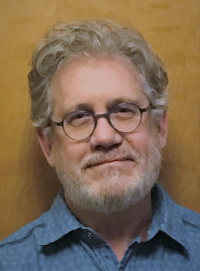
D.R. James’s latest of nine collections are Flip Requiem (Dos Madres, 2020), Surreal Expulsion (Poetry Box, 2019), and If god were gentle (Dos Madres, 2017), and his micro-chapbook All Her Jazz is free, fun, and printable-for-folding at Origami Poems Project. He lives in the woods near Saugatuck, Michigan.
Visit his Amazon author page by clicking here
.
.
___
.
.
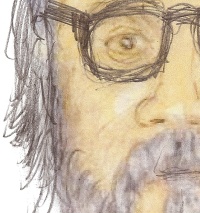 Henry Denander is an artist and a poet. He is the author of six chapbooks
Henry Denander is an artist and a poet. He is the author of six chapbooks
of poetry and his most recent poetry collection The Accidental Navigator was published by Lummox Press in San Diego, California. His poetry and art have been published in many American books and magazines. He has a website with poetry and art at www.henrydenander.com
.
.
___
.
.
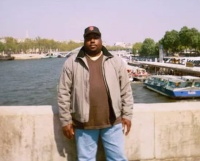
Erren Kelly is a two-time Pushcart nominated poet from Boston whose work has appeared in 300 publications (print and online), including Hiram Poetry Review, Mudfish, Poetry Magazine, Ceremony, Cacti Fur, Bitterzoet, Cactus Heart, Similar Peaks, Gloom Cupboard, .and .Poetry Salzburg.
.
.
___
.
.

Gary Jude is from London, but has been living and working in Bern, Switzerland for many a year now. His poems have been published in various UK poetry magazines.
.
.
___
.
.
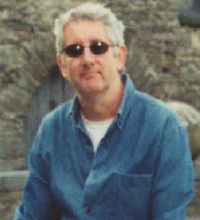
Byron Beynon coordinated Wales’ contribution to the anthology Fifty Strong (Heinemann). His poems and essays have featured in several publications including Agenda, The Independent, Wasafiri, The London Magazine, Poetry Ireland and the human rights anthology In Protest (University of London and Keats House Poets). He is the author of 11 collections of poetry including The Echoing Coastline (Agenda Editions). He lives in Swansea, Wales.
.
.
___
.
.
Anthony Ward chooses to write because he has no choice. He writes to get rid of himself and lay his thoughts to rest. He derives most of his inspiration from listening to jazz since it is often the mood which invokes him.
.
.
___
.
.
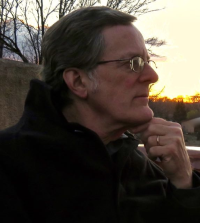
Craig Smith is the author of Sing My Whole Life Long: Jenny Vincent’s Life in Folk Music and Activism. He is currently at work on a book about the song “Joe Hill.”
.
.
___
.
.
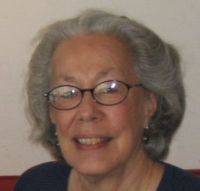
Social issues are a major focus of Milwaukee poet Phyllis Wax. Her poetry has appeared previously in Jerry Jazz Musician and in many other journals and anthologies online and in print. A Best of the Net and Pushcart Prize nominee, she has read in coffee houses, bars, libraries and on the radio. She can be reached via email at [email protected].
.
.
_____
.
.
About the artists who contributed their work to this collection
.
Francis Wolff was a partner in Blue Note Records. He brought his camera to every Blue Note recording session, masterfully capturing an important chapter of jazz history. His early efforts resulted in some of the most intimately revealing and relaxed portraits ever made of many jazz giants during the pre-war era. (photos published courtesy of Michael Cuscuna and Mosaic Images)
Sam Guillemot is a self-taught Paris-based artist whose work is influenced by street art. His portraits are drawn with ballpoint pen on newspaper articles that are relevant to his subject.
Russell Dupont is a realist painter, printmaker, photographer and author. His artwork is included in a number of public and private collections.
Martel Chapman found artistic inspiration in Francis Wolff’s cover photograph of John Coltrane’s Blue Train album, and has been creating art honoring the artistic genius of jazz music ever since.
Christel Roelandt, a Belgian painter from Ghent in Flanders who now lives in Beirut. Her work focuses on the human form; faces and nudes, and she finds inspiration by all things beautiful and often by books, music and films.
Andres Chaparro is a mixed media painter and collagist whose bold and expressive art is a visual representation of jazz music. He draws upon the music to create work that challenges the viewer to accept the unfortunate divide and divisiveness that exists in society.
Henry Denander is a watercolor artist whose work includes portraits of jazz musicians and jazz culture. He is also a poet who has authored six chapbooks of poetry.
William Gottlieb was a photographer and columnist who, while on assignment for the Washington Post, Downbeat and Record Changer, photographed many of the great jazz musicians of the 1930s and 1940s. In 1995 he dedicated his work – over 1600 photographs – to the public domain.
Vakseen is a Los Angeles-based realist painter whose work has been exhibited in museums all over the world. He is also a multi-platinum music executive, producer and songwriter.
Paul Lovering is an Edinburgh-based portrait painter.
Fred Jourdain is a versatile artist: illustrator, cartoonist, designer and entrepreneur who believes taking on all of these roles is the best way to ensure the quality of his work.
.
.
___
.
.
Click here to read the winter collection of jazz poetry
Click here to read the autumn collection of jazz poetry
Click here to read “Under Quarantine — COVID-era poetry of Erren Kelly
.
Click here to learn how to submit poetry or short fiction
.
.
.




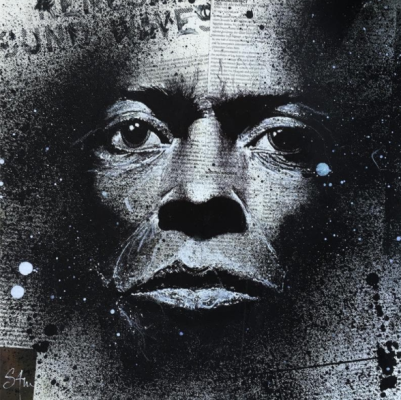
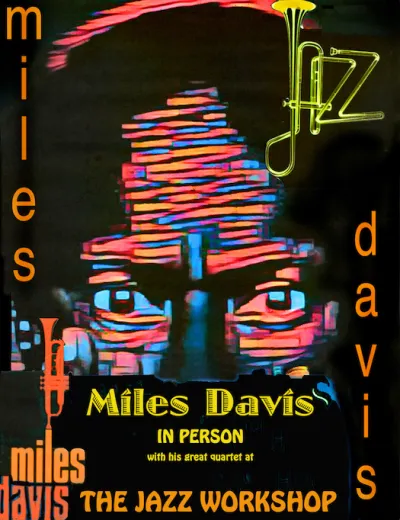
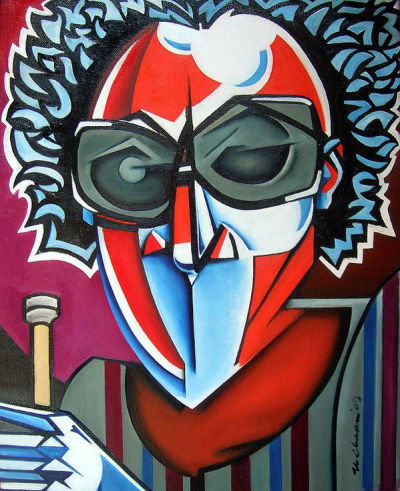
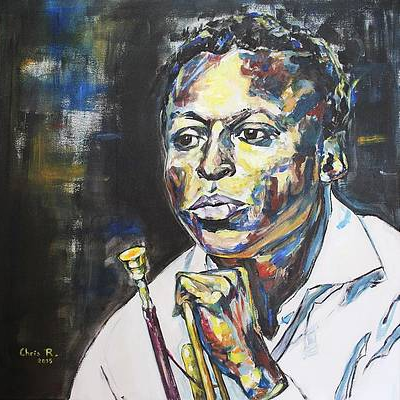
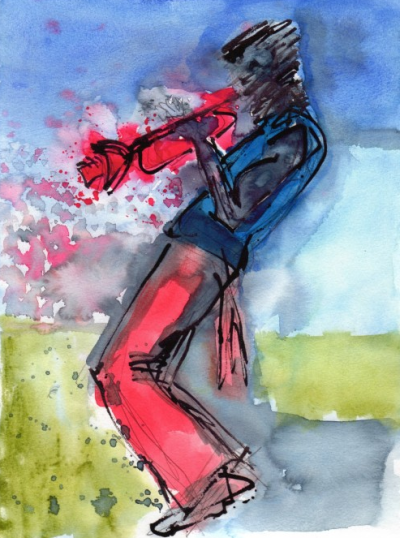
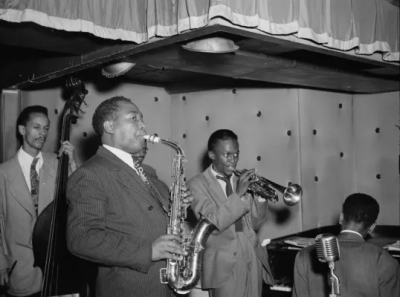
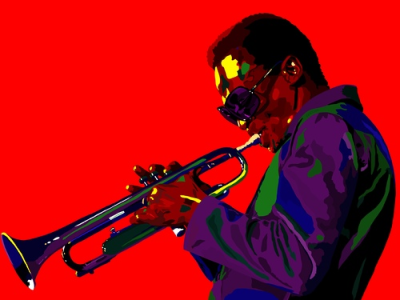
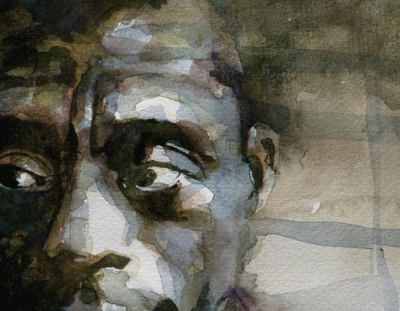
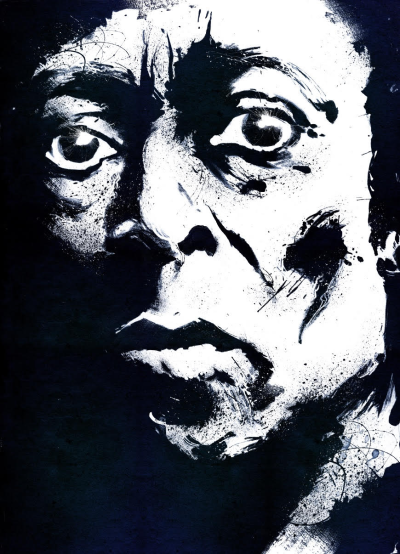
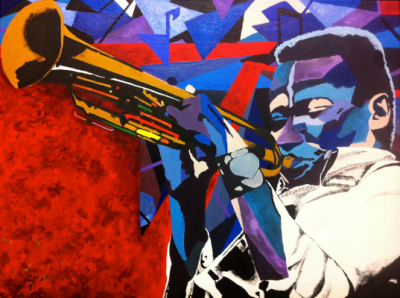




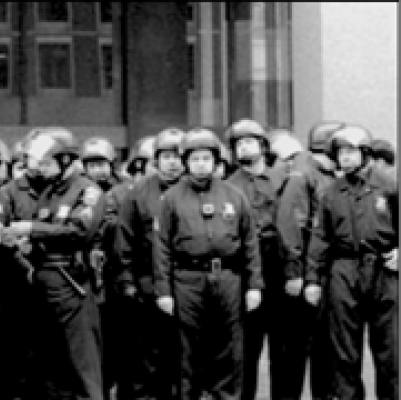
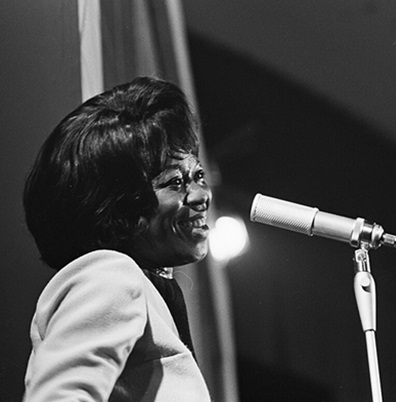












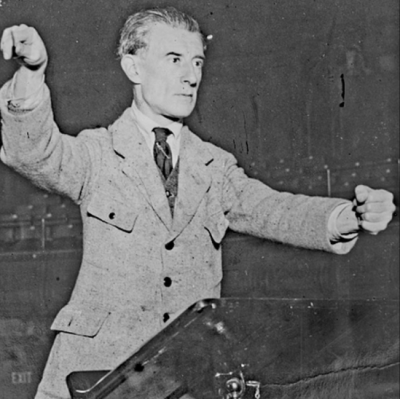

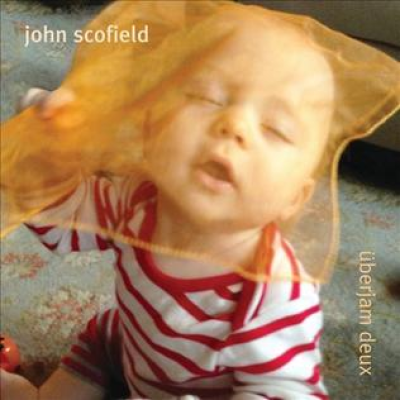



















This collection of poems is filled with fine poems and writers for whom I have considerable respect, too many for an old man to address all the poems and writers he is moved by. I do, though, want to take the time to acknowledge how much I enjoy reading and re=reading “Doo-Bopping with Miles” by Aurora M. Lewis. Ms. Lewis is always worth reading, but this particular poem of hers has really grabbed my attention. I tip my hat to her achievement. Bop on, I say, on and on and on.
P. W. Bridgman’s “Kind Of Blue (Found Poems)” is a highly skilled, thoroughly arresting achievement that sneaks up on a reader. A fine poem, skillfully rendered by a poet who disguises just how much craft he has, while writing with great insight about music of profound depth.
“Ode To Kind Of Blue:
All That We Need. Nothing More.”
The poem above has all of the qualities I expect from one of my favorite jazz poets, Freddington. It has a strong narrative voice, effective imagery, clear diction, and a strong sense of rhythm. He is one writer whose work I would love to find in book form. I always enjoy his work. Write on, hermano, write on.
There are a wide range of writers, all of whom are interesting, in this collection put together by Joe Maita. Among them are writers whom I have read on several occasions and who have become writers whose work I seek out. They are, in a sense, a family of writers whose work warms and inspires me. The following list is not all inclusive, but includes poets whose work frequently delights and pleases me: John Stupp, Alan Yount, Arlene Corwin, Aurora M. Lewis, Erren Kelly (who never fails to improve my day when I read his work), Freddingtonn (always a joy), John L. Stanizzi (who also has much fine work on display in many issues of Verse-Virtual), P.W. Bridgman, Patricia Carragon, Phyllis Wax, Dr. Roger Singer, Russell Dupont, Terrance Underwood, Susandale, Ed Coletti (plain-spoken and insightful).